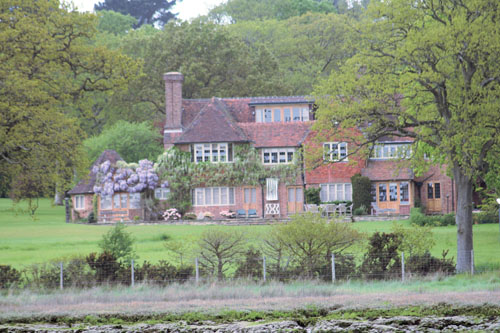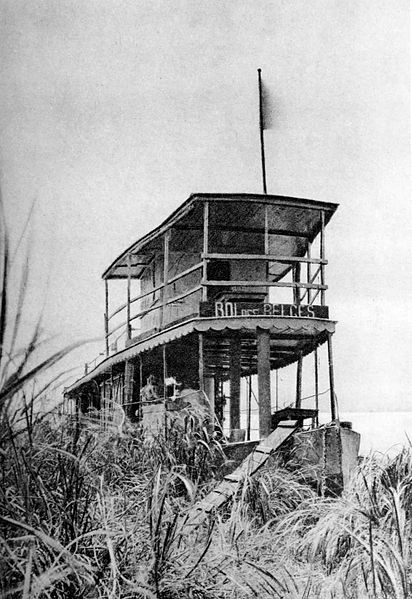The Heart of the Family
Over the last year I discovered Elizabeth Goudge, a 20th century Christian author with a remarkable gift for capturing the beauty and sense of place in the English countryside that forms the setting for many of her books. Readers of Goudge will be familiar with her trilogy about the Eliot family, their indomitable matriarch Lucilla Eliot, and their country estate Damerosehay, a 16th-century mansion patterned after the the one to which Goudge herself retreated to face her own inner demons.
The real Damerosehay is demolished, but this country estate is listed at the Elizabeth Goudge website as suggestive of how it may have looked:
The Heart of the Family concludes the series about the Eliots, and I found it the most difficult and least enjoyable of the three. A great deal of it revisits ground already covered in The Bird in the Tree and Pilgrim’s Inn through descriptions of places and people, which is fine if you feel the attachment to this family that many readers apparently do. It gives you the sense of returning to a loved place for a visit.
I find myself impatient with the Eliots this time around. Members of the gentry, they have little to do, it seems, other than hold forth in philosophical discussion about things they openly admit they haven’t really experienced, chiefly suffering. Their casual quoting of Shakespeare and discussions of various works of art seemed implausible to me in Pilgrim’s Inn because it’s hard to imagine so much easy brilliance in the same genetic pool. Several times as I was reading this book I felt like Goudge was really writing drama, as the book is full of set speeches where characters give voice to Goudge’s views on a variety of weighty topics including suffering, infidelity, death and dying, war, artistic temperament, and mental anguish. The idea of substitution reappears as well, an idea I also encountered in Charles Williams’ novels, whereby a person can offer up their own suffering on behalf of another person.
Much is written about the spirituality of Elizabeth Goudge, but the more I read of her the less I see much of any true vertical dimension in her books. It may be that I, with my Protestant sensibility, simply miss it. But mostly it seems like her way of configuring the problems and solutions of human existence is horizontal. People strive to attain a level of enlightenment through which they can help one another, admittedly in God’s name, but through a conception of prayer that seems to have more to do with reaching a particular mystical union with others than with actually interacting with God as a divine Person. If you’re a reader of Goudge, feel free to comment on this and direct my attention to anything I may be missing. On one hand I like the emphasis on spiritual discipline and mental transformation; it’s a nice antidote to an exclusively verbal faith. But this seems weighted too far the other way, toward, almost, self-salvation.
To sum up, this book revisits the Eliot clan and introduces a new character into the mix: Sebastian Weber, a guest at Damerosehay whose experience in World War II poses a stark contrast to the privileged Eliots. We also meet David and Sally’s two children and greet their third. There is little physical action, but a fair amount of discussion and flashback, and Goudge somewhat heavy-handedly works out her ideas about suffering, the contrasts of life and character, and the romantic idea that children and the elderly have mystical insight because they are “trailing clouds of glory” — close to “the other world.” The unmistakably occultish flavor of some of her ideas about the spirits that haunt certain places and people is present but much less prominent in this book. Written in response to requests for another story about the Eliots, The Heart of the Family no doubt satisfies those hungry for a bit more resolution and confidence in the family’s future after Pilgrim’s Inn.




5 Comments
Carrie, Reading to Know
I got stuck on the picture of the house! It’s fascinating. It looks pieced together and yet like it all belongs and is storybook-esque. That would be such a fun place to explore…or live in.
Janet
Isn’t it wonderful? The house in the book is surrounded by gardens, too, each with its own personality. It’s really something.
Even though I liked this book less than others I’ve read by EG, it still shows her ability to really see a place and describe it in a way that captivates — kind of like that picture.
Mouseprints
I’ve never read anything by this author, ‘though I’ve heard of her. Which of her books would be the best place to start?
Janet
The first book I read was The Scent of Water, and it’s still my favorite. I discovered it while looking for a copy of The Little White Horse — probably her best known book and on a lot of middle-grade reading lists, though I wasn’t aware of it till recently.
hopeinbrazil
I appreciated your insights into Goudge. I have liked some of her books much more than others. Though her theology doesn’t always line up mine, she’s still one of my favorite authors because her characters have to make hard choices that don’t always result in Hollywood-ized happy endings. Goodness over personal pleasure is a theme that resonates with me.